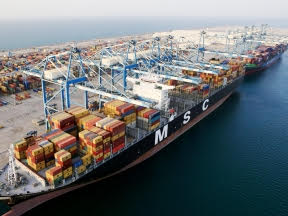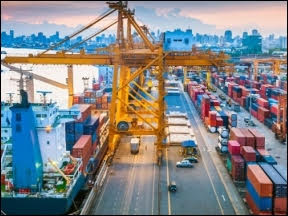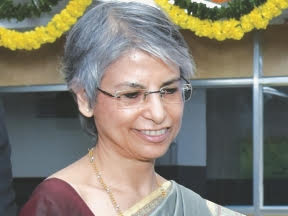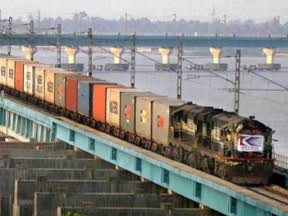Ensuring the vaccine reaches every nook and corner of the world, Satish Lakkaraju, CCO, Agility Logistics lists five key areas. Firstly, the vaccine needs greater temperature maintenance between 2 degrees to 8 degrees because otherwise the potency of drug is not going to have the impact and that is one area where airports need to be prepared. Secondly, I want to focus on airports and seaports. Fortunately, all airports have pharma zones and in the present scenario what is critical for us is to increase the awareness of handling at the airports when the vaccine comes. Thirdly, we would need government policy because we don’t have any clear policy in terms of green channels if the vaccine comes into the country. Fourthly, I want to stress on people because we don’t have sufficient trained people to handle the vaccine across the country. Once we are talking about exports, we also have a larger chunk of domestic movement that will happen. The fifth aspect technically would be to see how we price it at this point of time for the common man to also get the medicine because if you are doing by airfreight then it is going to be maintained at a certain temperature. We need to find innovative solutions which will ultimately help everyone get this vaccine.
Read More »CSP Abu Dhabi Terminal launches new direct services to Europe and Indian Subcontinent
CSP Abu Dhabi has announced the start of a direct, weekly service to several ports across Europe and the Indian Subcontinent. The new direct service will be served by a fleet of eight vessels on rotation, ranging in capacity between 10,000 to 13,000 TEU. Direct exports from Abu Dhabi to the ports of Rotterdam, Hamburg, London, Antwerp, and Le Havre, will consist primarily of polymers while returning vessels will carry a mix of general and project cargo imports. The ports of Karachi, Nhava Sheva, and Mundra will also benefit from the new service. Naser Al Busaeedi, Deputy CEO, CSP Abu Dhabi Terminal, said, “Our new services will significantly increase the movement of cargo exports and imports between Abu Dhabi, Europe and India, providing our customers with solutions to tackle their international shipment needs, as well as the opportunity to target new markets.” Mohamed Eidha Tannaf Al Menhali, Acting Director, Khalifa Port, said, “This new dedicated service marks an important strategic step in Abu Dhabi Ports’ vision to transform Khalifa Port’s end-to-end logistics capability.”
Read More »TIACA join hands with Pharma.Aero to prepare air cargo industry for COVID-19 Vaccine
In order to develop global guidance for the air cargo industry of optimal transportation of the COVID-19 vaccine, The International Air Cargo Association (TIACA) partnered with Pharma.Aero, once the vaccine is developed. The guidance will be developed gradually in four work packages through a joint working group to ensure feedback from all stakeholders in the supply chain of air cargo and pharmaceuticals. The aim of this program is to provide the air cargo industry with more clarity of the demands, expectations and quality supply chain requirements, including but not restricted to critical trade lanes, air cargo capacity, handling and storage, track and trace requirements, for the transportation of the vaccines. At the same time, shippers will gain more understanding about the capabilities of the various logistics players. This will ensure that once the vaccine is available in the market, the air cargo industry will be ready to respond to the needs of the shippers and transport vaccines in optimal conditions to all corners of the globe.
Read More »12 Major Ports report 18% dip to 193 MT in April-July: IPA
According to the Indian Ports Association (IPA), India’s major ports continued to witness a fall in cargo handling, registering 18.06 per cent dip to 193.38 million tonnes (MT) between April and July this fiscal. Cargo volumes at these 12 major ports under the control of the Centre declined for the fourth straight month in July 2020 and all ports barring Mormugao saw a negative growth. These 12 ports had together handled 236.01 MT of cargo during April-July 2018-19. In the wake of the COVID-19 outbreak, sharp declines were witnessed in handling of containers, coal and POL (petroleum, oil and lubricant) among other commodities. Ports like Chennai, Cochin and Kamrajar saw their cargo volumes nosedive over 30 per cent during April-July, while JNPT and Kolkata suffered a drop of over 20 per cent. India has 12 major ports under the control of the central government — Deendayal (erstwhile Kandla), Mumbai, JNPT, Mormugao, New Mangalore, Cochin, Chennai, Kamarajar (earlier Ennore), V O Chidambarnar, Visakhapatnam, Paradip and Kolkata (including Haldia). These ports handle about 61 per cent of the country’s total cargo traffic. These ports handled 705 MT of cargo last fiscal. While Chennai port saw 32.53 per cent decline in cargo handling to 11.08 MT, Kamarajar (Ennore) port suffered a drop of 35.64 per cent to 7 MT in April-July, as per IPA data. Cochin Port saw a dip of 32.78 per cent to 7.76 MT during the period. Cargo handling at JNPT port slipped 27.69 per cent to 16.94 MT, while the same at Kolkata declined 26.09 per cent to 16.05 MT. Mumbai port logged a fall of 19.79 per cent to 15.85 MT.
Read More »From the pages of CargoTalk: It is time to bring ATF under the GST regime: Tulsi Mirchandaney
Looking at various components of cost, Tulsi Mirchandaney, Managing Director, Blue Dart Aviation, says, “Air Turbine Fuel (ATF) accounts for 40 per cent of total direct cost of aircraft operation. Perhaps it is time now that freighters should be treated differently; at least bring them under the GST regime. Secondly, it is the cost of infrastructure. Now privatisation has brought us many benefits, be it the efficiency that has come in the airport, the kind of facilities we have or reduced dwell times but still the cost is high. The model of revenue sharing needs to be viewed differently so that it is cost neutral between the government as well as the airport operators. Thirdly, it is important that we deliver on time certain modules and for that we need to do our own self-handling which is possible for an airport operator and we have had that in several airports, but some airports still view us differently. The solution to this could be to lease the facility directly from an airport operator rather than from a third party who neither adds quality nor more efficiency in terms of process nor reduces the cost.
Read More »DB Schenker introduces airfreight & contract logistics hub of 51,400 sq m in Singapore
DB Schenker has started operations at the Red Lion warehouse in Singapore, a regional hub for automated high-speed logistics. The warehouse worth is 101 million euros and is the single largest investment in any site globally in Schenker’s corporate history. Strategically located in the Airport Logistics Park of Singapore (ALPS) at Changi Airport, the site sets a new standard in combining the world’s most advanced technological developments with the highest levels of sustainable warehouse management for its customers. Jochen Thewes, Chief Executive Officer DB Schenker, says, “Our new logistics hub makes us even faster and more reliable for our customers. The record investment in Red Lion marks an unparalleled milestone for our corporate history of almost 150 years. We are happy and proud to reinforce our commitment to Singapore as the heart of our logistics operations in Asia.” Red Lion solidifies Schenker’s position in Singapore as the largest and most advanced third-party logistics provider in the ALPS. Combined, the mechanized air freight hub and contract logistics warehouse extend over 51,400 square meters on five floors, equal to the size of seven soccer fields. A next generation Warehouse Management System and a synchronized IT platform bridging the various automations enable Red Lion to increase warehouse productivity by up to 100% compared to manual processes, and to reduce lead time for customers by 40% compared to non-integrated facilities.
Read More »Railways announces 5% discount to container train operators
The Indian Railways has announced a discount of five per cent in the freight rates to the Container Train Operators (CTOs) to attract more containers to the rail mode. The discount will be valid till April 30 next year. Indian Railways has taken this step to get more freight at a time when the country is facing lower demand throughout the pandemic. The move, however, does not satiate the private container train operators (CTOs), who had wanted to waive off of entire haulage charges on movement of empty containers. The Association of Container Train Operators (ACTO) had sought continuation of waiving off-of haulage charges for moving empty boxes. This discount also aims to lower the logistics cost.
Read More »First-ever ‘Kisan Rail’ flagged off to transport perishables
In order to ensure fast transportation of agricultural produce across the country, Indian Railways has launched Kisan Rail service for transportation of perishable goods with refrigerated coaches. The train will run between Deolali in Maharashtra to Danapur in Bihar covering the journey of 1,519 kilometres in 32 hours. It is expected to reduce transportation costs by Rs 1000 per tonne compared with roadways and reduce travel time by around 15 hours. Narendra Singh Tomar, Agriculture Minister, says, “Kisan Rail would help the farmer get his due for his produce. Kisan Rail and Kisan Udan were announced to ensure farmers are able to avail robust transport facilities. During lockdown, Railways ran 4610 trains and as a result, there was no shortage of food supply.” The train will halt at Nasik Road, Manmad, Jalgaon, Bhusaval, Burhanpur, Khandwa, Itarsi, Jabalpur, Satna, Katni, Manikpur, Prayagraj Chheoki, Pt. Deendayal Upadhyay Nagar and Buxar. The train, which will run on a weekly basis, is expected to build a national cold supply chain for perishable items like fish, meat and milk.
Read More »From the pages of CargoTalk: Drivers need to be protected with COVID-19 cover: Ashok Goyal
While listing concerns where the industry needs help from government, Ashok Goyal, Managing Director, BLR Logistiks, says, “Honestly, nothing has been done by government as far as logistics is concerned. Firstly, we need COVID-19 cover for drivers because they are the ones who are on road from day one and making the supplies available. The COVID cover is required to make them feel safe. Secondly, we are working on credit with our customers, hence we feel that either the interest on the working capital should be waived off completely or they should give us some reduction. There has been imbalance in terms of GST norms the government has put up especially for logistics business. We are under RCM and FCM both; there is no level field for all the players. Simplification is needed. Last but not the least is diesel which is our key component and is 55 per cent of our freight cost; the way its price is going up needs to be streamlined or if it can be similar in all the states.
Read More »Maersk revamps Europe to Middle East & Indian Subcontinent network to move more cargo
To enhance reliability while building a network that helps customers with more resilient and agile supply chains, A.P. Moller – Maersk announces improvements to its network between Europe and the Middle East & Indian Subcontinent (West Central Asia). The updated network will connect more cargo via the Maersk hub in Colombo (Sri Lanka), allowing customers to do consolidation from different origins and better connect their cargo from both Asia and West Central Asia. Furthermore, by linking Middle East stronger to Maersk key hubs in Europe, the changes provide customers additional flexibility and agility to move cargo between different markets. “To meet changing customer needs, we have reviewed our service network and identified opportunities to create new solutions for how we connect Europe and the Middle East & Indian Subcontinent region. Through increased flexibility and connectivity these changes will offer new, interesting ways for our customers to connect their supply chains both from an import and export perspective,” says Johan Sigsgaard, Head of Europe and Middle East Trades, A.P. Moller – Maersk.
Read More » Cargo Breaking News
Cargo Breaking News









